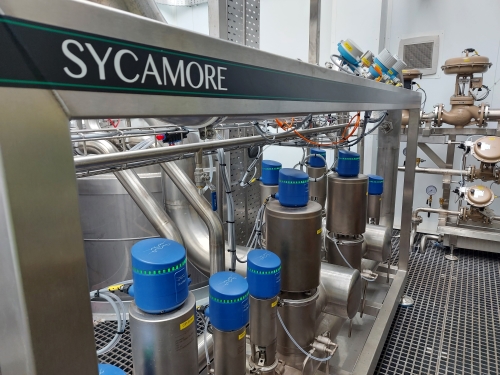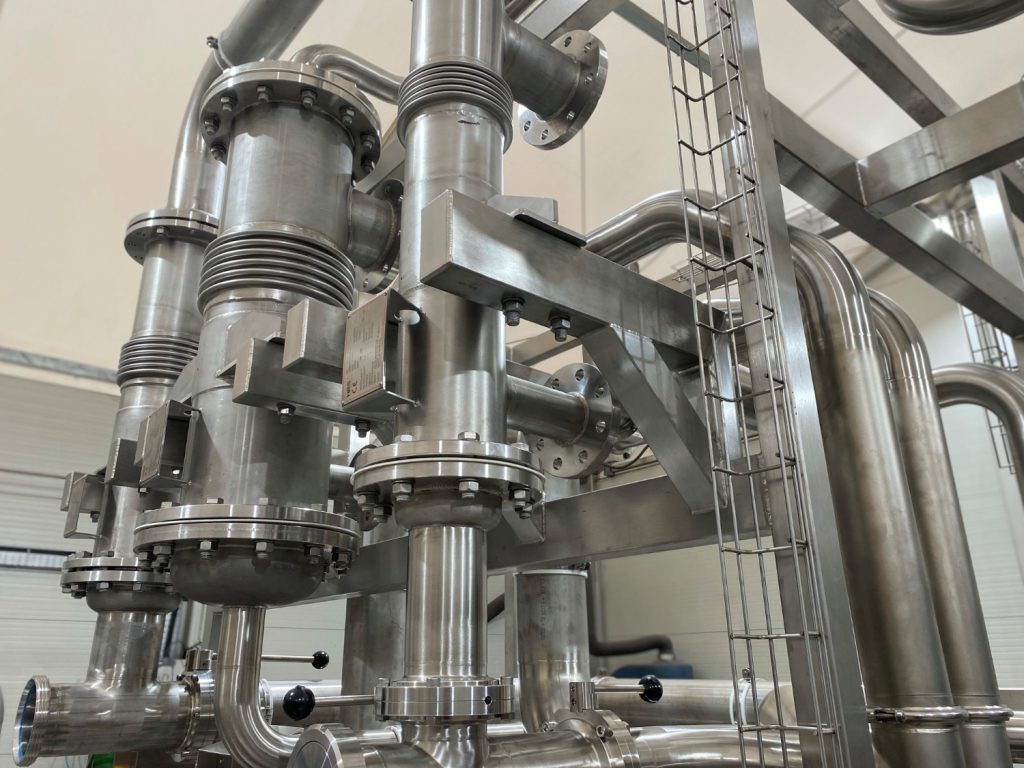
The North British Distillery Company Clean In Place Project
Sycamore Process Engineering has recently delivered a three-tank, two-channel, fully automatic Clean in Place (CIP) System for The North British Distillery Company (TNBDC) at their Edinburgh distillery.
“The design of the system has enabled TNBDC to undertake segregated cleaning of equipment, reducing production downtime, offering increased reliability and safety improvements throughout the CIP cleaning system.”
Paul Donaldson, Project Manager,
The North British Distillery Company
TNBDC is one of Scotland’s oldest and largest Scotch grain whisky producers. They specialise in the distillation and maturation of grain spirit that is used as the base for blended whisky. TNBDC has been producing their grain spirit since 1887 and is continued to be used in many well-known brands including Johnnie Walker and The Famous Grouse.
Lorien Engineering Solutions were appointed EPCM providers. Lorien have a strong portfolio of CapEx projects they have managed across the food, drinks and brewing sectors. After satisfying a vigorous pre-qualification we were invited to tender.
“Sycamore shares Lorien’s ethos of collaborative working and successfully delivered the process element of this multi-faceted project. This coupled with a Safety-First mentality means I would have no hesitation in inviting Sycamore to tender future (projects).”
Nick Jones, Brewing and Distillery Sector Manager,
Lorien Engineering Solutions

The project was to deliver design, manufacture and install a new three-tank, two-channel CIP system for the distillery. The system is used to clean the washbacks, distillation columns and other ancillary equipment within their mash house more efficiently than the existing CIP set, allowing for increased production time.
After the Technical Sales Team had provided worked hard in providing a robust and accurate costing, with a solution that would provide TNBDC with efficient cleaning of their processing plant, the Design Team were able to fully specify the CIP system that would be delivered to TNBDC. Our in-house team of process engineers, mechanical engineers and CAD engineers worked collaboratively to ensure the most efficient cleaning routes for TNBDC were delivered.
As part of the design stage and in collaboration with our automation partners Au2mate, and TNDBC, a full HAZOP was undertaken to verify the safe operation and running of the plant. The HAZOP was conducted over a seven-day period, where members from the Sycamore team, Au2mate, TNBDC and Lorien, worked collaboratively to ensure our customer was satisfied with the operation of the plant.
As with all new systems, health and safety needs to be at the forefront of everyone’s mind, especially due to the temperatures of the CIP fluid and the strength of the chemicals being used. For additional protection the detergent tank was fitted with two high-level probes while the return lines had dual conductivity sensors, enabling a duty/standby safety feature.
The mechanical design of the project proposed a unique challenge due to the CIP room only having a 7m² footprint. However, our Design Team were able to work collectively with TNBDC and their structural engineers, to design a second mezzanine floor located on the building supporting framework installed by the structural engineers, allowing the CIP set to be housed in the compact footprint available on site. Paul Donaldson,
Once the design had been finalised utilising the most efficient process and practical mechanical solutions, the project was able to advance into the workshop for the manufacturing phase to commence. The manufacture of the CIP system was completed by our team of skilled engineers in our workshop located at our offices in Sparkford, Somerset. Our workshop engineers benefit from being able to work closely with the Design Team who created the manufacturing drawings. Throughout manufacturing this phase, we were able to discuss and capture any opportunities for improvement which were noticed when manufacturing the CIP system. as well as being able to work together on any issues that arose.

As the project moved to the onsite installation this was led by one of our lead engineers James Conroy. Our team of onsite installation engineers started the ingress of equipment in December 2021 ahead of returning in January 2022 to complete the installation and enable the commissioning and optimisation of the CIP system. As part of this installation stage, we were able to be flexible and work with TNBDC preferred site installation contractors to ensure the installation was completed on time and to the quality that was required.
Understanding our customer’s needs and ensuring all parties are protected is key, both before and after the commissioning phases of any project, therefore, we provide a detailed Project Support Package, highlighting critical spare parts for both the commissioning phase and the aftercare once the project goes live into production. This safeguards both Sycamore and TNBDC, ensuring replacement parts are on hand should a failure occur, potentially causing lengthy downtimes. This is being magnified by today’s volatile market where we are all experiencing supply chain issues and increased lead times.
Further support has been offered to TNBDC, utilising our partnership with Alfa Laval as an Authorised Integrator. We have facilitated a suite of on-site training for TNBDC engineers for the Hygienic fluid handling equipment we supplied, ensuring they are competent with the general day-to-day maintenance and fault finding, along with gaining knowledge of how the equipment performs and functions.
As part of the CIP upgrade project, TNBDC also worked with another one of our partners InTank Technologies Limited to further improve the cleaning process of their equipment. TNBDC have a large number of 200m³ and 400m³ Fermenters which have been using fixed spray balls, these balls have been used for many years and with the Distilleries CIP upgrade project it was decided to see if anything could be done to improve the existing cleaning performance.
A study was carried out across the two sizes of fermenters to confirm the optimum cleaning head technology and the minimum CIP flow rate required to satisfactorily and repeatably clean these Fermenters.
“TNBDC had previously worked with Intank solutions to assess the feasibility to upgrade the cleaning heads on site. Then ew TJ40G Rotajet from Alfa Laval was identified as the best option. After an initial trial by TNBDC, this indeed proved to be the case. This upgrade was then rolled out to the rest of the plant.”
Brynjar Olafsson, Project Engineer,
The North British Distillery Company
The project was completed to an extremely high level of quality which is a credit to all team members involved, from the enquiry stage through to the aftercare. the design and installation to the support provided to the Distillery once it was installed. We look forward to future opportunities to help within this industry as well as other CIP enquiries through the Dairy, Food, Beverage and Plant-Based industries.

